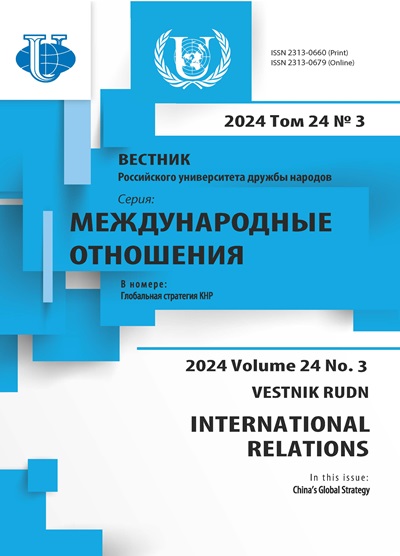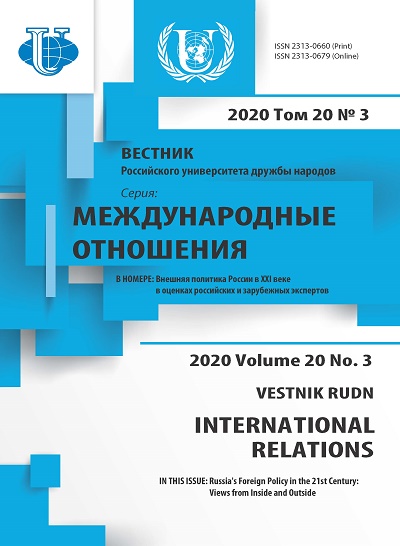Владимир Путин, двадцать лет спустя: внешняя политика России
- Авторы: Фрейре М.Р.1
-
Учреждения:
- Университет Коимбры
- Выпуск: Том 20, № 3 (2020): Внешняя политика России в XXI веке в оценках российских и зарубежных экспертов
- Страницы: 449-462
- Раздел: ТЕМАТИЧЕСКОЕ ДОСЬЕ
- URL: https://journals.rudn.ru/international-relations/article/view/24620
- DOI: https://doi.org/10.22363/2313-0660-2020-20-3-449-462
Цитировать
Полный текст
Аннотация
В статье прослеживается основная динамика российской внешней политики с момента прихода к власти Владимира Путина в 2000 г. Следуя конструктивистскому подходу к анализу внешней политики, данное исследование сочетает изучение внутреполитических процессов и международных отношений, а также исходит из понимания внешней политики как сочетания материальных и идейных аспектов. Дискурсивные практики, определяющие формирование внешней политики, являются результатом социального взаимодействия, а значит, сочетания этих элементов в различных форматах и соотношениях. Во внешнеполитическом курсе России выделяются три основных измерения: нормативное, определяющее руководящие принципы для формирования внешней политики, статусное измерение как расстановка сил, лежащая в основе разработки внешней политики, и измерение, основанное на идентичности, онтологически характеризующее внешнюю политику. Все три аспекта анализа соорганизуются и усиливают друг друга в различные моменты и в различных конфигурациях. Автор приходит к выводу, что главная конечная цель российской внешней политики, состоящая в сохранении статуса великой державы, за последние двадцать лет не изменилась. Претерпели изменения лишь средства и способы достижения данной цели как в отношении более активной внешней политики, так и в отношении усиления давления с целью пересмотра международного порядка, в связи с чем в системе международных отношений Россию изображают как ревизионистскую державу.
Ключевые слова
Об авторах
Мария Ракель Фрейре
Университет Коимбры
Автор, ответственный за переписку.
Email: rfreire@fe.uc.pt
доктор наук по международным отношениям, научный сотрудник Центра социальных исследований, профессор международных отношений экономического факультета
Коимбра, ПортугалияСписок литературы
- Allison, R. (2014). Russian “Deniable” Intervention in Ukraine: How and Why Russia Broke the Rules. International Affairs, 90 (6), 1255-1297. doi: 10.1111/1468-2346.12170
- Breuning, M. (2007). Foreign Policy Analysis: A Comparative Introduction. Basingstoke: Palgrave Macmillan. doi: 10.1057/9780230609242
- Freire, M.R. & Heller, R. (2018). Russia’s Power Politics in Ukraine and Syria: Status-seeking between Identity, Opportunity and Costs. Europe-Asia Studies, 70 (8), 1185-1212. doi: 10.1080/09668136.2018.1521914
- Freire, M.R. (2017). Política externa russa no ‘interméstico’. Uma abordagem construtivista. Relações Internacionais, 55, 35-49. doi: 10.23906/ri2017.55a03
- Freire, M.R. (2018). The Quest for Status: How the Interplay of Power, Ideas, and Regime Security Shapes Russia’s Policy in the Post-Soviet Space. International Politics, 56, 795-809. doi: 10.1057/s41311-018-0164-y
- Gerrits, A. (2020). Russia in the Changing Global Order. Multipolarity, Multilateralism and Sovereignty. In: Hosli, M.O. & Selleslaghs, J. (Eds.). The Changing Global Order. Challenges and Prospects. Cham: Springer. P. 85-107. doi: 10.1007/978-3-030-21603-0
- Goble, P. (2016). Russian National Identity and the Ukrainian Crisis. Communist and Post-Communist Studies, 49 (1), 37-43. doi: 10.1016/j.postcomstud.2015.12.006
- Hill, C. (2003). The Changing Politics of Foreign Policy. Basingstoke: Palgrave Macmillan.
- Houghton, D.P. (2007). Reinvigorating the Study of Foreign Policy Decision Making: Toward a Constructivist Approach. Foreign Policy Analysis, 3 (1), 24-45. doi: 10.1111/j.1743-8594.2007.00040.x
- Kirton, J. & Larionova, M. (Eds.). (2018). BRICS and Global Governance. London: Routledge. doi: 10.4324/9781315569925
- Kowert, P.A. (2010). Foreign Policy and the Social Construction of State Identity. In: Denemark, R.A. & Marlin-Bennett, R. (Eds.). The International Studies Encyclopedia. Hobokon, NJ: Wiley-Blackwell. doi: 10.1093/acref/9780191842665.001.0001
- Light, M. (2003). In Search of an Identity: Russian Foreign Policy and the End of Ideology. Journal of Communist Studies and Transition Politics, 19 (3), 42-59. doi: 10.1080/13523270300660017
- Lo, B. (2002). Russian Foreign Policy in the Post-Soviet Era. Reality, Illusion and Mythmaking. Basingstoke: Palgrave Macmillan. doi: 10.1057/9781403920058
- Lukyanov, F. (2010). Russian Dilemmas in a Multipolar World. Journal of International Affairs, 63 (2), 19-32. URL: http://jia.sipa.columbia.edu/russian-dilemmas-multipolar-world/ (accessed: 12.03.2020).
- Makarychev, A. (2010). La Presidencia de Medvédev: El Perfil Cambiante de la Federación Rusa. Anuario Internacional CIDOB, 435-442.
- Manning, B. (1977). The Congress, the Executive and Intermestic Affairs: Three Proposals. Foreign Affairs, 55 (2), 306-324.
- McFaul, M. (2018). Russia as It Is. Foreign Affairs, 97 (4), 82-91.
- Neack, L. (2008). The New Foreign Policy. Power Seeking in a Globalized Era. 2nd edition. Lanham, Boulder: Rowman and Littlefield Publishers.
- Putnam, R.D. (1988). Diplomacy and Domestic Politics: The Logic of Two-Level Games. International Organization, 42 (3), 427-460. doi: 10.1017/S0020818300027697
- Rangsimaporn, P. (2009). Russia as an Aspiring Great Power in East Asia. Perceptions and Policies from Yeltsin to Putin. Basingstoke: Palgrave Macmillan. doi: 10.1057/9780230244740
- Saideman, S. & Ayres, R.W. (2007). Pie Crust Promises and the Sources of Foreign Policy: The Limited Impact of Accession and the Priority of Domestic Constituencies. Foreign Policy Analysis, 3 (3), 189-210. doi: 10.1111/j.1743-8594.2007.00047.x
- Sakwa, R. (2012). Modernisation, Neo-modernisation, and Comparative Democratisation in Russia. East European Politics, 28 (1), 43-57. doi: 10.1080/13523279.2011.636034
- Sergunin, A. (2020). Russia’s Strategies towards BRICS: Theory and Practice. In: Parlar, D.E. & Erşen, E. (Eds.). Russia in the Changing International System. Cham: Palgrave Macmillan. P. 133-152. doi: 10.1007/978-3-030-21832-4
- Sjöstedt, R. (2007). The Discursive Origins of a Doctrine: Norms, Identity, and Securitization under Harry S. Truman and George W. Bush. Foreign Policy Analysis, 3 (3), 233-254. doi: 10.1111/j.1743-8594. 2007.00049.x
- Suslov, M. (2017). The Production of “Novorossiya”: A Territorial Brand in Public Debates. Europe-Asia Studies, 69 (2), 202-221. doi: 10.1080/09668136.2017.1285009
- Tsygankov, A. (2014). The Frustrating Partnership: Honor, Status, and Emotions in Russia’s Discourses of the West. Communist and Post-Communist Studies, 47 (3-4), 345-354. doi: 10.1016/j.postcomstud. 2014.09.004
- Yefremenko, D.V. (2014). Crossing Red Lines. Russia in Global Affairs, 3. URL: https://eng.globalaffairs.ru/articles/crossing-red-lines (accessed: 12.03.2020).
- Zevelev, I. (2014). Russia’s National Identity Transformation and New Foreign Policy Doctrine. Russia in Global Affairs, 2. URL: https://eng.globalaffairs.ru/articles/the-russian-world-boundaries/ (accessed: 12.03.2020).











